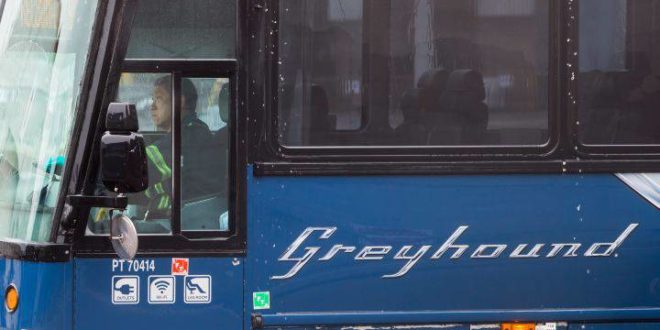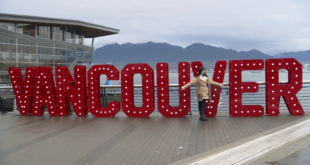Shortly after news emerged a major Canadian coach service provider is planning to abandon its operations in Western Canada (aside from one route between Vancouver and Seattle), Edmonton Mayor Don Iveson expressed dismay over the development at Greyhound Canada, signalling “it’s going to have huge implications.”
“It’s concerning,” Iveson said on Monday. “It’s going to have implications for labour mobility for people [and] for people getting home to their families in different communities that come and go from Edmonton regularly.
“On the other hand it might open up some new market opportunities too, so we’ll see what happens.”
Greyhound Canada announced Monday that its bus and freight services in Western Canada will cease as of the end of October.
da.
“Simply put, the issue that we have seen is the routes in rural parts of Canada — specifically Western Canada — are just not sustainable anymore,” the company’s senior vice-president, Stuart Kendrick, said in an interview with The Canadian Press. “This decision is regretful and we sympathize with the fact that many small towns are going to lose service.”
According to Greyhound Canada, which will continue offering service in Quebec and Ontario, the decision will result in the loss of over 400 jobs.
On Monday, Global News spoke to Seth Grandjambe, a Greyhound passenger from Fort McMurray waiting at the coach service’s Edmonton station.
“I take the bus every weekend cause I’m from Fort Mac and I just come here (to Edmonton) every weekend and hang out with my friends,” he said. “[The lack of Greyhound service will leave] me being stuck up there every weekend.”
Listen below: Greyhound Canada’s announcement that it will cease almost all of its Canadian bus service west of Sudbury is discussed on Charles Adler Tonight.
Cole McCotter was also waiting at the Edmonton Greyhound station on Monday.
“It sucks for the people that want to ride it every weekend to get places — some people don’t have cars… and rely on this,” he said. When McCotter was asked how the lack of bus service will impact people in the smaller communities he passes through, he was blunt in his assessment.
“It’s gonna suck for them,” he said. “They won’t have any way of transportation to get to work or anything like that.”
Alberta’s transportation minister called on Ottawa to come up with a way to fill the gap in bus service Greyhound’s departure will leave.
“Given the developments today, we need the federal government to step up and come up with a national solution that keeps Canadians connected across the country,” Brian Mason said in an emailed statement. “Greyhound’s decision to discontinue service in the Prairies is an issue of national importance.”
Late Monday afternoon, Transport Canada issued a statement in which it said “there are no federal government funding programs that would provide an operational subsidy for private intercity bus carriers,” and suggested a response was perhaps more incumbent on the provinces as opposed to Ottawa.
“The economic regulation of interprovincial bus carriers in federal jurisdiction has been delegated to the provinces and territories, under the federal Motor Vehicle Transport Act, the federal government has not taken an active role in supporting service provision,” Transport Canada said.
“There has not been a requirement for such programs,” the statement goes on to say. “In 2010, a task force of the provinces and the federal government recommended that there was no need for a national program to subsidize the operations of intercity bus carriers.”
According to Transport Canada, individual jurisdictions are free to subsidize particular routes or carriers if they so wish., adding since Greyhound began cutting services to various markets in 2009, many service gaps have been “filled by other bus companies, and by other modes.”
Iveson indicated the decision to discontinue service in Western Canada caught him off guard.
“I hadn’t heard anything that this was under contemplation,” he said. “We can discern that Greyhound’s been in some difficulty over the last few years but anyone could have picked up on that.
“The city didn’t have any special inside knowledge.”
The city had been working closely with Greyhound last year to help provide its passengers with access to the Edmonton Transit Service. Greyhound’s current Edmonton station has been criticized for its inaccessibility ever since it moved from its location in the city’s core to 121 Street just south of Yellowhead Trail.
In September, the city struck a deal with Greyhound that saw a shuttle bus bring passengers from the Greyhound station to the Kingsway transit centre under which Greyhound was given exclusive use of a bus bay at the hub.
“We had been working very hard to accommodate Greyhound in a way that would allow them to establish more of an intermodal hub and get some connectivity for their passengers to public transit,” Iveson said Monday.
A city spokesperson confirmed Monday that the shuttle service and bay provided to Greyhound at the Kingsway transit station did not come at any cost to the city.
Kendrick cited declining ridership as the main reason Greyhound was ceasing operations in Western Canada. The company said ridership has declined 41 per cent since 2010 and faced competitive pressure, including from national and regional passenger transportation options, the increasing popularity of low-cost airlines and the continued growth of car ownership.
“The company has experienced significant losses despite continued efforts to return to viability,” Kendrick said. “In the affected regions, the company has run an operating deficit since 2004.
“We have had substantial losses over several years as a direct result of declining ridership.”
“It makes sense maybe for the company but for the people, maybe not as much,” Grandjambe said. “Normally, when I hop on the bus, there’s lots of people and now, without the bus, there’s going to be lots of people without the ride… it’s just going to be weird.”
Mason said he plans to reach out to transportation ministers from other province’s affected by Greyhound’s move to discuss the development.
“We care deeply about making sure that Albertans can get to where they need to be,” Mason said.
[ad_2]You can read more of the news on source
 Travelsmart
Travelsmart



